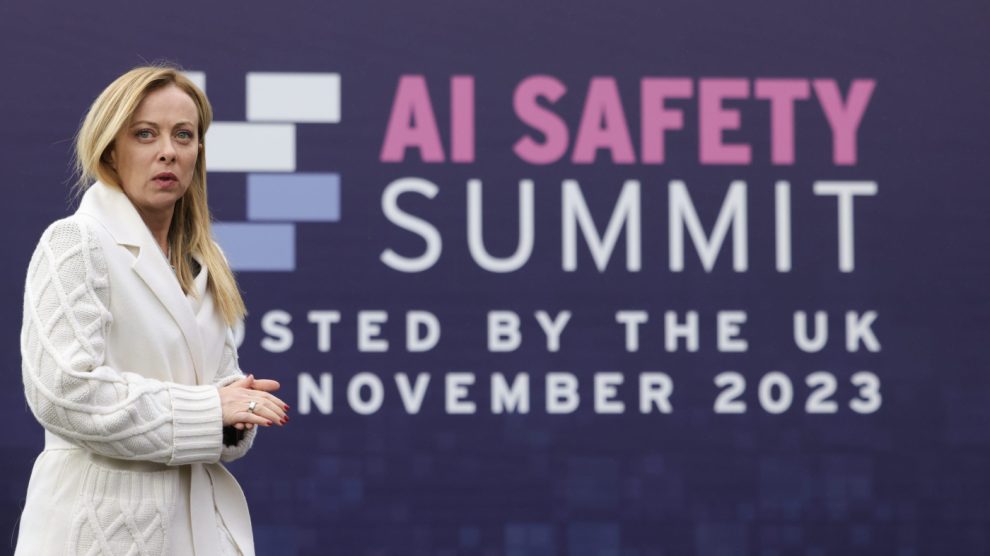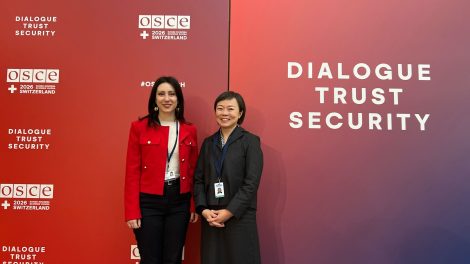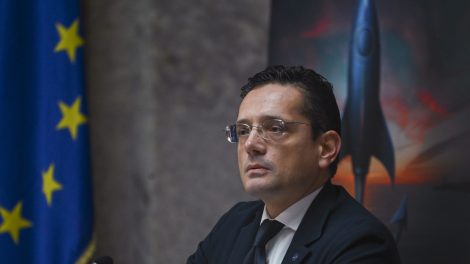The Meloni-Sunak bilateral. On Thursday, Italian Prime Minister Giorgia Meloni met with her British homologue, Rishi Sunak, on the sidelines of the AI Safety Summit underway at Bletchley Park. The two leaders discussed key bilateral and international issues – vowing to align on their approach to help overcome the Middle Eastern crisis and stressing the urgency of handling migration flows orderly.
- Back in April, the two had kicked off a process to bolster Italo-British ties across the board by signing a Memorandum of Understanding.
- But AI was front and centre during their talks on Thursday, with PM Meloni confirming it will be among the priorities of the Italian G-7 Presidency in 2024.
A global approach to governing AI. The Italian leader vowed that Rome would take the lead on regulating AI a few weeks before G-7 nations published their voluntary code of conduct – and the White House simultaneously issued an executive order bolstering governmental oversight and transparency on companies building AI models. These were all premises for the summit in the UK, where China, the EU and the US agreed to work together to manage the risk arising from the misuse of AI (a key British concern).
- The 29 participating countries signed the Bletchley Declaration, acknowledging that AI “should be designed, developed, deployed, and used, in a manner that is safe, in such a way as to be human-centric, trustworthy and responsible” and agreeing to “work together” to ensure that.
Rome’s defence of jobs… PM Meloni vowed to follow up with an international conference on AI and work, to be held in Rome in 2024, “in which we would like scholars, managers and experts from all over the world to participate and discuss methods, initiatives and guidelines to ensure that AI helps and does not replace those who work, instead improving their conditions and prospects.”
- She stressed that the development of AI without rules risks driving an increasing number of people out of the labour market “with very serious consequences on the fair distribution of wealth.”
… and focus on speed and algorethics. The world needs “multilateral governance mechanisms” to ensure “ethical barriers to AI,” continued the Italian PM during her address, stressing that’s the spirit of the Rome Call for AI Ethics that emerged from the Vatican in 2020 (in a conference that gave birth to the concept of algorethics, “that is, to give ethics to algorithms”). She then called to define a proper regulatory framework in order to take advantage of AI’s opportunities.
- “It will take many steps and adjustments in the years to come, collaboration with private parties, but innovation and regulation must go hand in hand. It means that the thing that has to worry us most is our slow decision-making in relation to the speed of development of new technologies.”
Work is underway. Meanwhile, the Minister for Enterprise and Made in Italy, Adolfo Urso – who arrived earlier in Bletchley Park and met with his homologue on the summit’s sidelines – has been meeting all his colleagues from G-7 countries who oversee matters of industry and AI, outlining the prospects of the Italian G-7 presidency and its specific focus on frontier technologies and AI.
- On Monday, he discussed AI and industry with France’s and Germany’s economy ministers, Bruno Le Maire and Robert Habeck, in Rome.
- Then, during the two-day Summit in Bletchley Park, he met with Gina Raimondo, US Secretary of State for Trade and Nat Fick, Ambassador at Large at the State Department’s Bureau of Cyberspace and Digital Policy; the UK’s Michelle Donelan, Secretary of State for Science, Innovation and Technology, and George Freeman, Minister of State for Science and Space; Canada’s François-Philippe Champagne, Minister of Innovation, Science and Industry; and Japan’s Komori Takuo, Deputy Minister of Internal Affairs and Communications.





